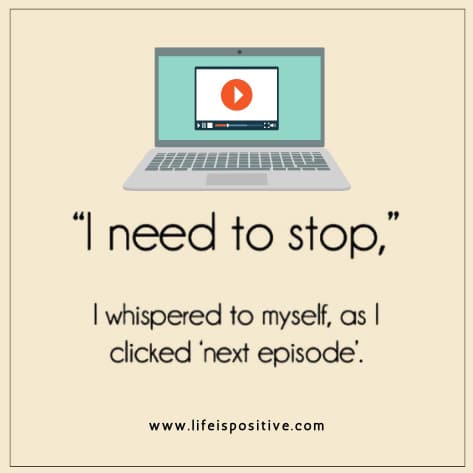|
Getting your Trinity Audio player ready...
|
Ever found yourself glued to the screen for hours, devouring one episode after another?
Binge-watching has become a national pastime, especially with streaming platforms making it so easy. But have you ever wondered how unhealthy binge-watching really is?
Spoiler alert: It’s more than just a guilty pleasure. Read on to uncover the shocking truths about your binge-watching habits!
The Surprising Dangers of Binge Watching
1. Sedentary Lifestyle: The Silent Health Risk
Let’s be real – binge-watching often means hours spent on the couch. This sedentary behavior can lead to serious health issues like weight gain, cardiovascular problems, and even type 2 diabetes.
Sitting for extended periods isn’t just bad for your waistline; it’s a health hazard.
2. Eye Strain: Watch Out!
Staring at a screen for hours can wreak havoc on your eyes. Digital eye strain is no joke! Symptoms include dry eyes, headaches, and blurred vision.
To combat this, follow the 20-20-20 rule: every 20 minutes, look at something 20 feet away for 20 seconds. Trust me, your eyes will thank you!
3. Poor Posture: The Hidden Pain
We all love to get comfy while watching TV, but those cozy positions can lead to poor posture. Slouching on the couch or lying in bed can cause back and neck pain over time.
Make sure to sit with proper support and keep your screen at eye level to avoid these issues.
Mental Health: The Emotional Toll
1. Sleep Disruption: The Binge-Watching Curse
One more episode… we’ve all been there! But staying up late to finish a season can seriously mess with your sleep schedule. Lack of sleep affects your mood, memory, and overall health.
To get quality sleep, set a strict cutoff time for your TV watching and stick to it.
Read: Sleep Tips: 10 Tips to Sleep Better
2. Increased Anxiety and Depression: The Dark Side of Binge Watching
While binge-watching can be a great escape, it can also contribute to feelings of anxiety and depression. Intense shows with cliffhangers keep your adrenaline pumping, making it hard to unwind.
Plus, spending too much time alone with your screen can lead to social isolation. Balance your TV time with real-world interactions to keep your mental health in check.
3. Dopamine Addiction: The Brain’s Response
Binge-worthy shows are designed to keep you hooked, releasing dopamine in your brain every time you hit “next episode.”
Over time, your brain craves these dopamine hits, making other activities less enjoyable. Mix up your routine to keep your brain healthy and happy.
3. Social Life: The Real-World Impact
1. Isolation: The Lonely Side Effect
Spending hours alone binge-watching can lead to social isolation. It’s easy to replace face-to-face interactions with fictional characters, but real relationships need nurturing, too.
Make time for friends and family to keep your social life thriving.
2. Relationship Strain: TV vs. Real Life
When you prioritize TV over people, relationships can suffer. Your partner or friends might feel neglected if you’re always choosing Netflix over them.
Set boundaries and communicate to maintain a healthy balance between screen time and quality time with loved ones.
Read: Is Your Relationship Toxic?
How to Binge-Watch Responsibly
• Set Viewing Limits
Yes, you can still enjoy your favorite shows! Just set limits on how many episodes you’ll watch in one sitting. Use a timer or schedule specific TV hours to help keep your binge-watching under control.
• Stay Active
Incorporate movement into your binge-watching sessions. Try doing some stretches, yoga, or even light exercises during episodes. This helps counteract the sedentary nature of binge-watching and keeps your body in motion.
• Create a Comfortable Setup
Make sure your viewing environment is ergonomic. Sit in a chair with good back support, keep your screen at eye level, and ensure the room is well-lit to reduce eye strain.
This setup helps prevent physical discomfort and promotes better posture.
• Prioritize Sleep
Avoid watching TV late into the night. Set a specific time to turn off your devices and start winding down before bed. A regular sleep routine improves your overall well-being and helps you feel more refreshed.
Read: This Is The Best Sleep Positions to Boost Your Oxygen Levels
• Balance Screen Time with Other Activities
Diversify your free time with other activities. Spend time outdoors, read a book, or engage in hobbies that don’t involve screens. This reduces the time spent binge-watching and enriches your life with varied experiences.
• Watch with Friends or Family
Turn binge-watching into a social activity by watching with friends or family. This makes it more enjoyable and helps you stay connected with your loved ones.
Discussing the show afterward can enhance the experience and deepen your connections.
Final Thoughts On Binge-Watching
Binge-watching can be a fun way to unwind and enjoy your favorite shows, but it’s important to be aware of the potential downsides.
Remember to set limits, stay active, and mix up your activities to keep things balanced. Binge-watching doesn’t have to be unhealthy if you do it in moderation and take care of yourself along the way.
Next time you find yourself reaching for the remote, take a moment to think about how you can make your viewing habits healthier.
Happy watching, and don’t forget to press pause and enjoy life outside the screen, too!
For more empowering content, connect with our vibrant community here ➡️ Social Media.



